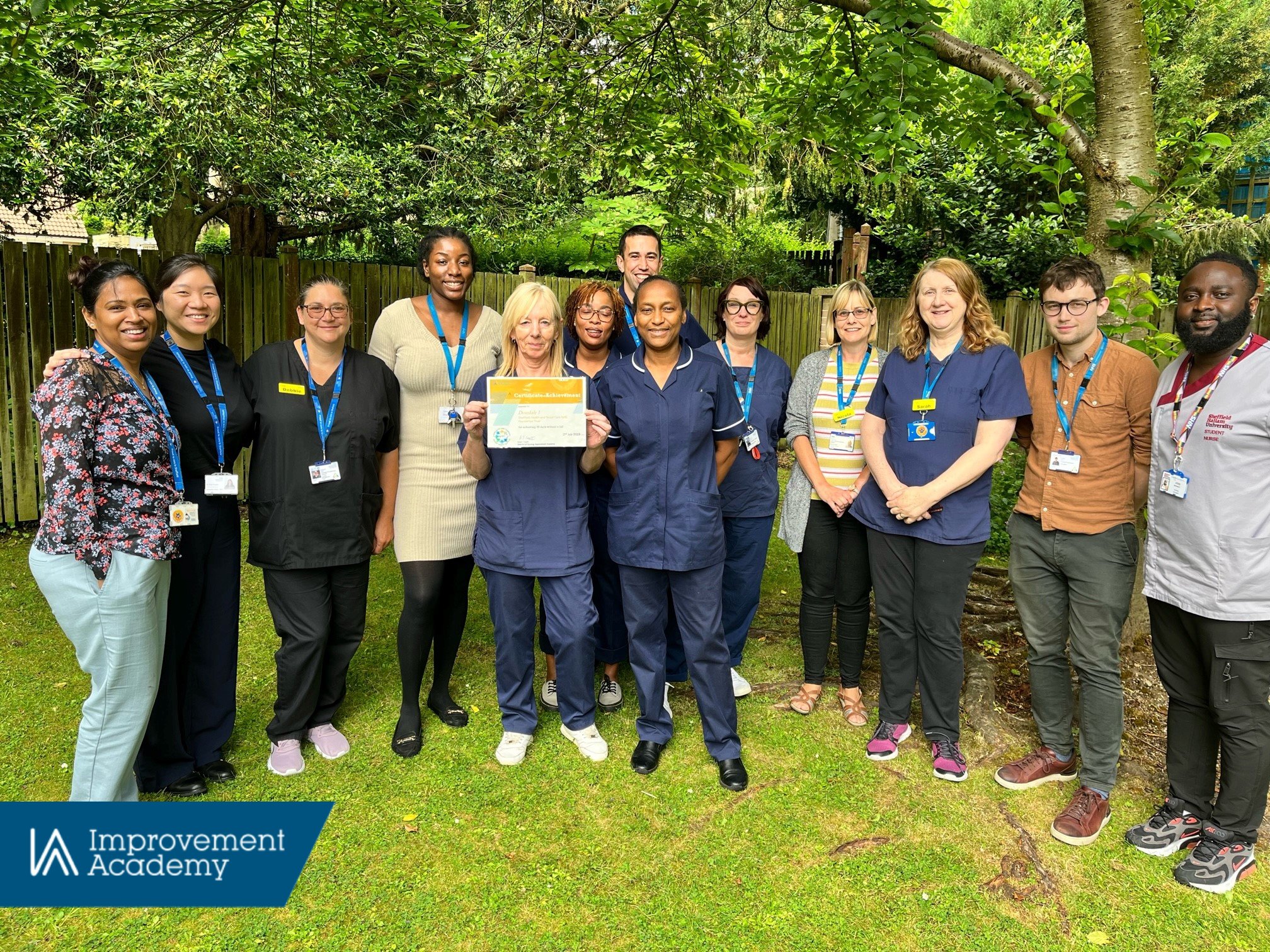The Improvement Academy (IA), based at the Bradford Institute of Health Research, is celebrating 10 years of its flagship Huddle Up for Safer Healthcare (HUSH) programme: an evidence-based intervention that has consistently demonstrated significant improvement in staff teamworking, improved team communication, job satisfaction and safety culture, and a reduction in patient harm.
HUSH provides a structured approach for implementing safety huddles in healthcare settings and encourages all team members (clinical and non-clinical) to come together briefly every day with a focus on an area of harm. The shared knowledge at the huddle improves situational awareness and teamwork, thus reducing patient harm as harms are anticipated and prevented and errors are learnt from.
In the last 10 years the IA has been studying and supporting the implementation HUSH safety huddles in a variety of settings and despite challenging times, including a pandemic, teams have achieved amazing results!
Dr Anna Winfield, Geriatrician and Specialist in Elderly Medicine and Quality Improvement (QI) at Leeds Teaching Hospitals NHS Trust and Clinical Leader in QI at the IA, shared,
“Over the last 10 years HUSH huddles have developed from an idea developed and tested by frontline ‘guinea pig’ healthcare teams in Yorkshire to a validated, evidence-based intervention that has been shown to improve teamwork and culture and reduce patient harm across a wide variety of healthcare settings across the UK. I can’t wait to see how it develops over the next 10 years!”
Some highlights from the IA’s HUSH programme include:
- Supporting 500 teams in 32 organisations across the UK (including: Barnsley Hospitals NHS Foundation Trust, Birmingham Community Healthcare NHS Foundation Trust, Harrogate and District NHS Foundation Trust, Leeds Teaching Hospitals NHS Trust, Milton Keynes University Hospital NHS Foundation Trust, Sheffield Health and Social Care NHS Foundation Trust, York and Scarborough Teaching Hospitals NHS Foundation Trust, NHS Humber and North Yorkshire ICB, North Yorkshire County Council, Dove House Hospice in Hull, and Sue Ryder Care.)
- Worked in 9 Healthcare delivery settings including, Mental Health, Community, Primary Care, Care Homes, Prison Health teams, Hospices, and Acute hospital wards.
- Teams have reduced harm in 16 different areas including, falls, pressure ulcers, deterioration, medication errors, restrictive practice, and violence and aggression.
- In the last 10 years, Huddles have helped to prevent over 12,000 falls.
- We have issued over 2000 certificates to teams reaching their harm reduction milestones.
- In 2015 we were awarded a £500,000 grant from the Health Foundation to scale up the intervention.
 Feedback from staff involved in safety huddles has also been very positive:
Feedback from staff involved in safety huddles has also been very positive:
“I understand if a patient is at risk, more now than ever before because I don’t have to seek out information because any issues are highlighted by the huddle.” Healthcare Assistant
“[Team] members work more co-operatively when caring for patients and are able to help each other more effectively.” Staff Nurse
“Huddles are the best thing we’ve ever done.” Senior Sister, St James’ University Hospitals Trust
“We are so grateful for all the help and support at the IA when we were presented with our great 2nd culture survey results.” Manager, Shetland House, Residential and Dementia Care Facility
“We are the first Mental Health service to introduce HUSH Huddles to our practice and can see how effective they have been. The huddles have massively reduced the number of falls and, because they are so effective, we have rolled out to other wards including Care homes. We would like to say a big thank you to the Improvement Academy for their help and would like to continue using these as they have boosted morale and energy levels.” Physiotherapist, Sheffield Health & Social Care NHS Foundation Trust
An independent evaluation by the University of Bradford stated that following the implementation of HUSH huddles more than three quarters of frontline team respondents reported improvements in communication (88%), teamwork (79%) and safety culture (75%) on their wards. 83% indicated they would miss the safety huddle if it were stopped tomorrow.
An independent evaluation by the University of York Health Economics Consortium showed an overall return on investment of 107%.
The HUSH programme won the HSJ Value Awards 2018 Patient Safety category for enhancing value through increasing patient safety and reducing litigation. Our initiative to introduce Huddles into all Sue Ryder’s Hospices was shortlisted in 2023 for QI Initiative of the Year at the HSJ Patient Safety Awards and in the same awards’ ceremony was awarded as ‘highly commended’ for the Huddles work in an in-patient mental health setting in Sheffield Health and Social Care NHS Foundation Trust.
If you are interested in implementing safety huddles in your organisation or learning more, visit our website on http://www.improvementacademy.org or email academy@yhia.nhs.uk and one of our team will be in touch.
(1) Improvement Academy
The Yorkshire and Humber Improvement Academy is a team of improvement scientists, patient safety experts and clinicians who are committed to working with frontline services, patients, and the public to deliver real and lasting change. We adopt a theory-based approach to improvement that’s practical, tried and tested.
The Improvement Academy was established in 2013 as part of the Bradford Institute for Health Research to support innovation and improvement in delivery of health care services. We are hosted within the NHS by Bradford Teaching Hospitals NHS Foundation Trust.
The Academy is the implementation arm of the NIHR Applied Research Collaboration in Yorkshire and Humber, and we deliver the Patient Safety Collaborative on behalf of the Yorkshire and Humber Health Innovation Network (previously known as the YH AHSN).
For more information, please visit: https://improvementacademy.org/
(2) Bradford Institute for Health Research
Bradford Teaching Hospitals NHS Foundation Trust has a strong track record of research and has between 500-600 research projects ongoing per year. It is home to the Bradford Institute for Health Research[1] (BIHR) which was established by the Trust in 2007 in recognition of the unique research partnership between the primary and secondary care NHS Trusts in Bradford and Airedale and its local Universities and local government. Since then, the BIHR has developed and increased its expertise in clinical research and notably applied health research and provides a critical mass of research expertise in the Trust. Due to the unique coalescence of academic, practice and community strengths, the BIHR has:
- An international reputation in applied research with a particular focus on child health, older people and quality and safety of health care including the Wolfson Centre for Applied Health Research[2] and the NIHR Applied Research Collaboration Yorkshire and Humber[3]
- A strong track record in clinical research with ability to recruit patients quickly (global and national firsts) and deliver recruitment targets. BTHFT hosts one of five NIHR National Patient Recruitment Centres[4]
- World class community research cohorts. Born in Bradford[5], the global-first experimental birth cohort study Born in Bradford’s Better Start and the Academic Unit for Ageing and Stroke Research (ASR) CARE 75+[6]frail elderly cohort are leading the world in community engagement in research and translation of research into policy and practice.
- One of the leading improvement agencies, the Yorkshire and Humber Improvement Academy[7], and one of the top patient safety teams the Yorkshire Quality and Safety Research Group[8]
- Whole system research. Bradford has an excellent track record of collaboration across health and education sectors and close co-production with patients and communities. In 2019 it was awarded a UK Prevention Research Consortium to establish an ActEarly ‘City Collaboratory’[9] to tackle the wider determinants of health.
- Connected data. Bradford hosts the Connected Yorkshire[10] programme that is working to enable safe and secure sharing and analysis of data to redesign pathways of care.
[1] https://bradfordresearch.nhs.uk [2] https://wolfsoncahr.uk/ [3] https://www.arc-yh.nihr.ac.uk/ [4] https://local.nihr.ac.uk/prc/bradford/ [5] https://borninbradford.nhs.uk/ [6] https://www.bradfordresearch.nhs.uk/care75/ [7] https://improvementacademy.org [8] https://yqsr.org/ [9] https://actearly.org.uk [10] https://www.bradfordresearch.nhs.uk/our-research-teams/connected-bradford/


Recent Comments